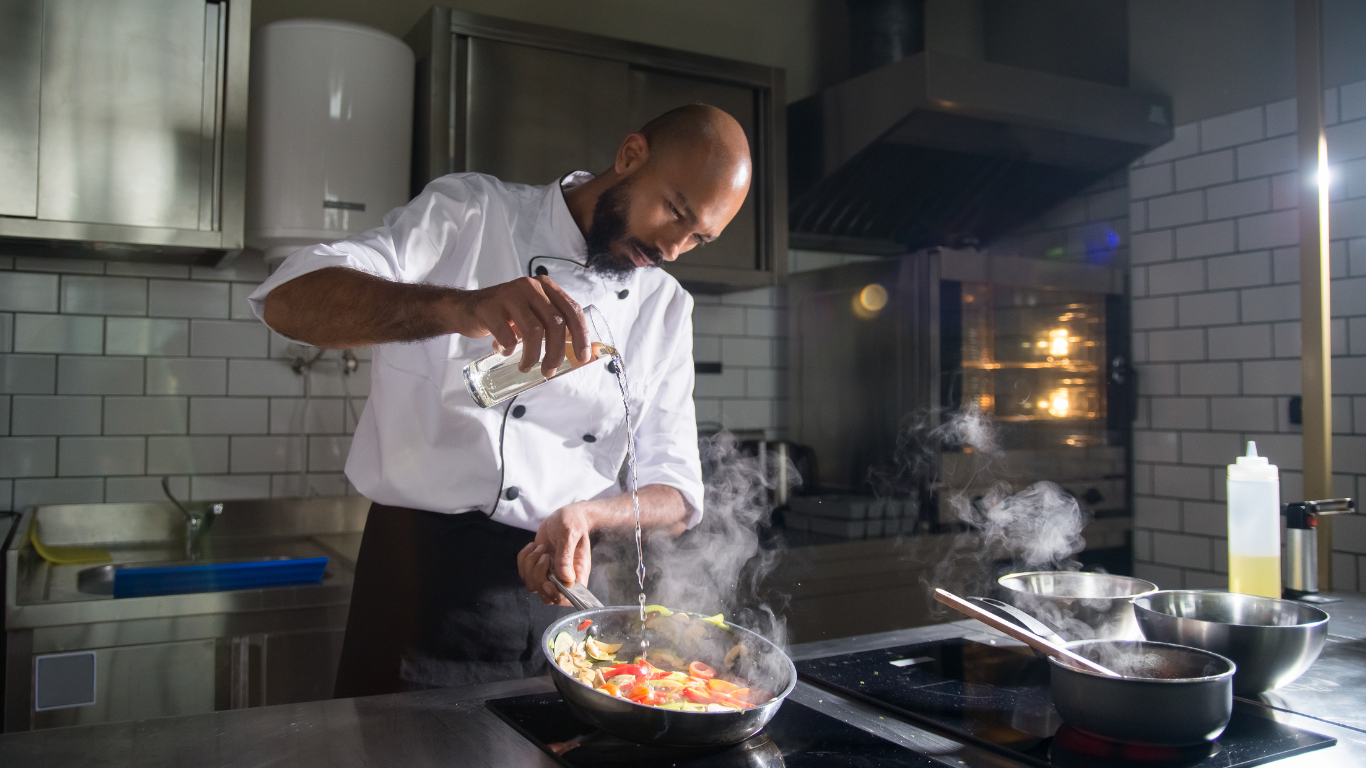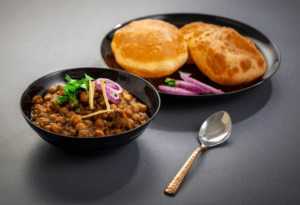Introduction:
In the world of gastronomy, the title of “chef” is not simply handed out—it is earned through hard work, dedication, and an unwavering passion for food. But what truly separates a great chef from the rest? Is it mastery over knife skills, an understanding of flavors, or the ability to run a kitchen like a well-oiled machine? The answer is all of the above, and much more.
In this blog post, we’ll delve into the core qualities, skills, and traits that make a great chef. Whether you’re an aspiring cook, a seasoned professional looking to refine your craft, or simply curious about the culinary arts, this guide will offer valuable insights into what defines greatness in the kitchen.
1. Passion for Food and Cooking
One of the most defining characteristics of a great chef is their deep, genuine passion for food. Cooking is more than just a job—it’s a way of life. This enthusiasm is often what fuels chefs to wake up early, work long hours, and still find joy in what they do.
Why Passion Matters:
- Endless Curiosity: A great chef is always curious about new ingredients, flavors, and cooking techniques. They are constantly exploring and experimenting, never satisfied with the status quo.
- Continuous Learning: Passionate chefs never stop learning. They attend workshops, read cookbooks, and try out new recipes. This drive to continually improve sets them apart from those who see cooking merely as a profession.
- Resilience: The kitchen can be a tough environment with high pressure and tight deadlines. A deep love for cooking keeps a chef motivated even when things get tough.
2. Exceptional Palate and Understanding of Flavors
A great chef has an exceptional sense of taste and the ability to balance flavors. They know how to combine ingredients in a way that complements each other, resulting in dishes that tantalize the taste buds.
Key Aspects of a Chef’s Palate:
- Flavor Pairing Knowledge: Understanding which ingredients work well together is critical. This knowledge goes beyond memorizing recipes—it involves recognizing the underlying components of flavor like acidity, sweetness, bitterness, and umami.
- Refining the Taste: A great chef can taste a dish mid-preparation and know exactly what’s missing, whether it’s a pinch of salt, a squeeze of lemon, or a dash of spices.
- Creativity with Ingredients: They are adept at creating new dishes by thinking outside the box, whether it’s reinventing classic recipes or creating modern fusion dishes.
3. Strong Leadership and Communication Skills
A great chef is not only responsible for preparing food but also for managing the kitchen staff. Running a kitchen is similar to orchestrating a symphony—everything needs to work in harmony, and that requires strong leadership.
Leadership in the Kitchen:
- Delegation: Chefs must assign tasks effectively to ensure that everything is prepared on time and up to standard. They know how to play to their team’s strengths, ensuring the best possible performance.
- Inspiring the Team: Great chefs motivate their team, offering guidance, support, and sometimes a bit of tough love. They help nurture the skills of their team members, leading by example.
- Crisis Management: The kitchen is fast-paced, and things often go wrong. Whether it’s an undercooked dish, a supply issue, or a team member calling out sick, a great chef handles these challenges with calm and composure, solving problems efficiently.
4. Impeccable Organization and Time Management
The best chefs are extremely organized, both in their work habits and in the way they run their kitchen. The ability to multi-task without losing focus is essential, especially during peak service times when orders are coming in fast and furious.
Importance of Organization:
- Mise en Place: This French term, meaning “everything in its place,” is a fundamental concept in any professional kitchen. Great chefs prepare their ingredients ahead of time, ensuring that cooking processes are smooth and efficient.
- Time Management: Knowing how long a dish takes to cook, understanding the timing of different elements, and ensuring that every dish leaves the kitchen at the right moment requires impeccable time management skills.
- Cleanliness: An organized chef keeps their workspace clean, not only for hygiene purposes but to ensure that they can work efficiently without clutter.
5. Creativity and Innovation
Cooking is both an art and a science, and great chefs understand the importance of creativity. While mastering techniques and recipes is important, it’s creativity that allows a chef to stand out and create unique, memorable dishes.
Key Elements of Culinary Creativity:
- Experimentation: Great chefs are constantly experimenting with ingredients, cooking methods, and presentations. They take risks and aren’t afraid to push boundaries, which often leads to the creation of innovative dishes.
- Personal Style: Many famous chefs are known for their distinctive cooking styles. Whether it’s a focus on molecular gastronomy or traditional farm-to-table cuisine, having a signature style can set a chef apart from the competition.
- Inspiration: A great chef draws inspiration from a variety of sources, including travel, cultural traditions, seasonal ingredients, and even art. They bring these inspirations into the kitchen, crafting dishes that tell a story.
6. Attention to Detail
Precision is key in the kitchen, and great chefs have an unparalleled attention to detail. From the way they cut vegetables to the exact temperature at which a steak is cooked, nothing is left to chance.
Why Details Matter:
- Consistency: Every dish that leaves the kitchen must be of the same high quality. A great chef ensures consistency in taste, presentation, and portion size, regardless of how busy the kitchen is.
- Presentation: Food presentation is an art form. The way a dish looks on the plate is just as important as how it tastes, and great chefs understand the importance of visual appeal.
- Ingredient Quality: Great chefs are meticulous about the ingredients they use. They source the freshest, highest-quality ingredients and are not afraid to reject anything that doesn’t meet their standards.
7. Technical Skills and Knowledge of Cooking Techniques
A great chef must be a master of technical skills. While creativity and leadership are important, it’s the technical abilities that serve as the foundation of their work. From knife skills to understanding the complexities of various cooking methods, technical expertise is non-negotiable.
Essential Technical Skills:
- Knife Mastery: Great chefs have impeccable knife skills, whether it’s finely dicing onions or deboning a fish. Speed and precision with a knife are essential in a busy kitchen.
- Cooking Techniques: From grilling and sautéing to poaching and sous-vide, a great chef is proficient in all key cooking techniques. They know when to use each method to enhance the flavor and texture of a dish.
- Sauce Making: Sauces are often the foundation of great cooking. A chef must know how to prepare classic sauces, such as béchamel, hollandaise, and velouté, as well as create their own signature versions.
8. Adaptability and Problem-Solving Skills
The kitchen is an ever-changing environment. Ingredients may be out of stock, equipment might fail, or a customer could have a special dietary request. A great chef must be adaptable and able to think on their feet.
Adapting in the Kitchen:
- Flexibility with Ingredients: Whether due to supply chain issues or seasonal changes, a chef must be able to substitute ingredients without compromising the quality of a dish.
- Handling Dietary Restrictions: With the growing number of dietary restrictions and preferences (vegan, gluten-free, nut allergies), a great chef must be knowledgeable about alternative ingredients and techniques.
- Troubleshooting: Problems are inevitable in the kitchen. Whether it’s an undercooked dish or an equipment failure, great chefs are quick to identify issues and resolve them without causing a disruption to service.
9. Commitment to Sustainability and Ethics
In today’s culinary world, sustainability and ethical practices are more important than ever. A great chef is conscious of where their ingredients come from and how their choices impact the environment.
Sustainability in the Kitchen:
- Sourcing Locally: Great chefs often work closely with local farmers and suppliers to source fresh, seasonal ingredients. This not only supports local businesses but also reduces the carbon footprint of transporting ingredients.
- Minimizing Waste: Reducing food waste is a key concern in the modern kitchen. A great chef knows how to use every part of an ingredient, from root to leaf, and practices responsible portioning to minimize waste.
- Ethical Choices: Whether it’s using free-range eggs, sustainable seafood, or ethically farmed meat, great chefs are committed to making responsible choices that benefit both people and the planet.
10. A Lifelong Dedication to the Craft
Finally, what truly defines a great chef is their lifelong commitment to the culinary arts. They view cooking not just as a career but as a calling. This dedication manifests in their constant pursuit of excellence, whether it’s mastering a new technique, mentoring the next generation of chefs, or simply perfecting a recipe.
The Chef’s Journey:
- Growth Mindset: A great chef never believes they’ve learned it all. They constantly seek out new opportunities to grow, whether through travel, collaborating with other chefs, or participating in competitions.
- Mentorship: Many great chefs take on the role of mentor, passing down their knowledge to younger chefs. This helps ensure the craft continues to evolve and grow.
- Legacy: Great chefs often leave behind a legacy, whether it’s a restaurant, a signature dish, or a culinary movement. Their influence can be felt for generations to come.
Conclusion:
Becoming a great chef is about far more than just cooking well. It’s a journey of passion, creativity, and continuous learning. From mastering the technical aspects of cooking to leading a team with grace under pressure, the path to culinary greatness is filled with challenges and rewards. Ultimately, what makes a great chef is their dedication to the craft, their unwavering pursuit of excellence, and their ability to inspire others with their love for food.




